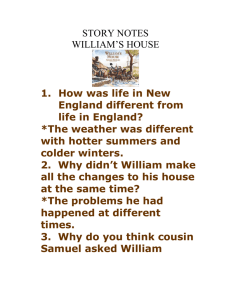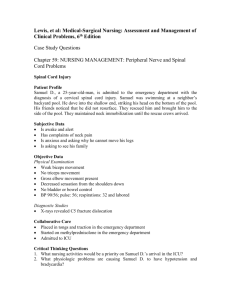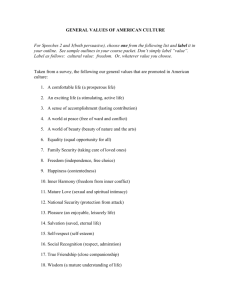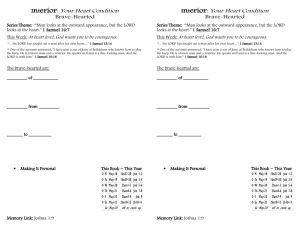DISCOVER WHO YOU REALLY ARE Week 1: Who Defines You
advertisement
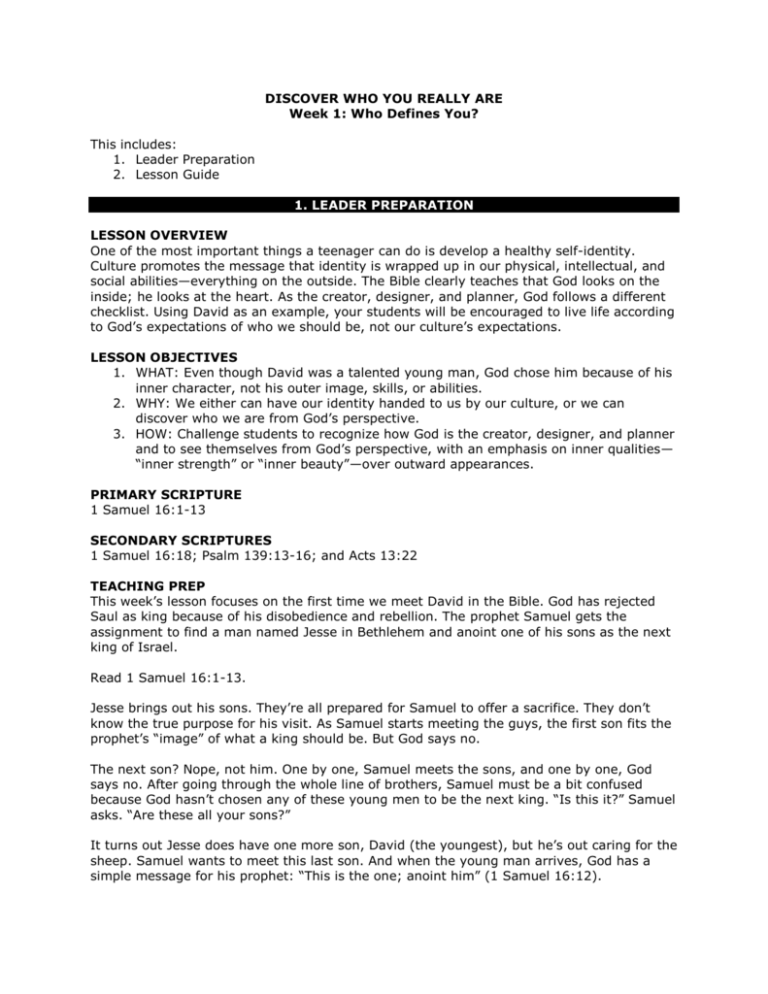
DISCOVER WHO YOU REALLY ARE Week 1: Who Defines You? This includes: 1. Leader Preparation 2. Lesson Guide 1. LEADER PREPARATION LESSON OVERVIEW One of the most important things a teenager can do is develop a healthy self-identity. Culture promotes the message that identity is wrapped up in our physical, intellectual, and social abilities—everything on the outside. The Bible clearly teaches that God looks on the inside; he looks at the heart. As the creator, designer, and planner, God follows a different checklist. Using David as an example, your students will be encouraged to live life according to God’s expectations of who we should be, not our culture’s expectations. LESSON OBJECTIVES 1. WHAT: Even though David was a talented young man, God chose him because of his inner character, not his outer image, skills, or abilities. 2. WHY: We either can have our identity handed to us by our culture, or we can discover who we are from God’s perspective. 3. HOW: Challenge students to recognize how God is the creator, designer, and planner and to see themselves from God’s perspective, with an emphasis on inner qualities— “inner strength” or “inner beauty”—over outward appearances. PRIMARY SCRIPTURE 1 Samuel 16:1-13 SECONDARY SCRIPTURES 1 Samuel 16:18; Psalm 139:13-16; and Acts 13:22 TEACHING PREP This week’s lesson focuses on the first time we meet David in the Bible. God has rejected Saul as king because of his disobedience and rebellion. The prophet Samuel gets the assignment to find a man named Jesse in Bethlehem and anoint one of his sons as the next king of Israel. Read 1 Samuel 16:1-13. Jesse brings out his sons. They’re all prepared for Samuel to offer a sacrifice. They don’t know the true purpose for his visit. As Samuel starts meeting the guys, the first son fits the prophet’s “image” of what a king should be. But God says no. The next son? Nope, not him. One by one, Samuel meets the sons, and one by one, God says no. After going through the whole line of brothers, Samuel must be a bit confused because God hasn’t chosen any of these young men to be the next king. “Is this it?” Samuel asks. “Are these all your sons?” It turns out Jesse does have one more son, David (the youngest), but he’s out caring for the sheep. Samuel wants to meet this last son. And when the young man arrives, God has a simple message for his prophet: “This is the one; anoint him” (1 Samuel 16:12). “Who am I?” That’s one of life’s biggest questions. At a young age, David understood who he was, and his identity was rooted in a solid relationship with God. David discovered that God truly is the creator, definer, and planner. NOTE: If you’re leading a group of girls, consider using “inner beauty” as a theme for the lesson. If you’re leading a group of guys, consider using “inner strength.” Identity issues are quite different for guys and girls, so we’ve provided a different mix of questions during the application time to help you with your gender-specific group. We aren’t attempting to reinforce cultural expectations but to offer you a framework that contextualizes the lesson for your students. What five words would you use to define who you are? Who and what define your identity? DISCOVER WHO YOU REALLY ARE Week 1: Who Defines You? 2. LESSON GUIDE GETTING THINGS STARTED If your students don’t already have a pen/pencil and piece of paper, provide those supplies to each of them. Ask students each to write five to eight words that describe who they are. The words don’t have to be adjectives—just a sampling of words that reveal something about your students. After a few minutes, ASK: Which words did you write, and why did you choose each word? Think about the lists you heard from the other members of our group. What other positive, encouraging words might you add to their lists, and why? SAY SOMETHING LIKE: One of the biggest experiences of your teenage years is gaining a clearer sense of identity—who you are. You’re no longer children, but you’re also not yet adults who have to carry greater responsibilities. Today’s lesson will help you gain a better understanding of how God—our creator, definer, and planner—sees you. TEACHING POINTS The goal of the Teaching Points is to help students capture the essence of each lesson with more discussion and less lecture-style teaching. The main points we have chosen here are: (1) God created us, (2) God defines our identity, and (3) God has a plan for our lives. Read 1 Samuel 16:1-13 together as a group. Consider allowing one or more of the teenagers to read the text. SAY SOMETHING LIKE: Let’s spend a few moments taking a look at how David knew who God was and how that knowledge helped David be aware of his God-formed identity. 1. God created us SAY SOMETHING LIKE: Our main Scripture passage reveals an early moment in David’s life—in fact, it’s the first time we meet him in the Bible. David is well-known for writing many of the songs and poems contained in the book of Psalms. Let’s take a moment to read a few verses a psalm so we can discover David’s understanding of God as his creator. ASK: Read Psalm 139:13-16. What do you learn about David’s perspective toward God as his creator through these verses? What do you learn about David’s self-identity from these verses? Why do so few teenagers seem to have this kind of confidence in who God is, how God sees them, and who they are? Explain. SAY SOMETHING LIKE: David is most likely the author of Psalm 139. Maybe he had times as a teenager when he struggled with putting all his trust in God. But we know from these words and other moments in his life that David had a personal relationship with God and knew that God was the creator of the universe. This gave David a secure identity as a child of God. 2. God defines our identity Have each student find a partner for this activity. Ask your teenagers to look at this list of six characteristics from 1 Samuel 16:18—that David was musical, brave, strong, had good judgment, was a fine-looking young man, and that God was with him. Have students discuss and then rank those six traits in the order of importance—first, using our culture’s standards and then using God’s standards. Have them discuss why differences exist between those two sets of standards. Bring everyone back together after a few minutes, and then ASK: Are you surprised by any differences between how you ranked the characteristics using God’s standards and the world’s standards? Explain. Imagine God asked you to write a job description for “Person God Can Partner With to Do Big Stuff.” As a group, identify the qualifications for that job. What surprises you most about what God tells Samuel in 1 Samuel 16:7, another one of the verses in our main passage today? If you had been Samuel, how would you have reacted? Explain. SAY SOMETHING LIKE: God wants to partner with handsome and pretty people, and average-looking teenagers, too. God will move through the world-class athlete and the most talented musician in town, but God will also move through the guy who can’t carry a tune and the girl who can’t make a free throw. Our culture places extra value on the people who are most athletic, most beautiful, most handsome, most powerful, most popular, most talented, most artistic, most wealthy—this is how the world says we should be defined. But God looks for the people who are most available, most willing, most faithful, most teachable, most obedient, most humble, most compassionate, most loving—people whose lives and whose identities reflect God’s heart. God is the one who defines our identity. 3. God has a plan for our lives ASK: David recognized God as the creator and definer in his life, but it’s also important to realize that God was the planner, too—David’s future wasn’t an accident. How was God’s plan for David evident in the verses we read from 1 Samuel 16? What plans do you believe God has for your life? Why do you feel those are God’s plans? SAY SOMETHING LIKE: God had a purpose and future planned for David. God has a purpose and future planned for each of us, too. It’s a unique plan that reflects his personal love for every person here. God created us, God defines our identity, and God has planned a meaningful, incredible life for each of us. David knew who he was because of the deep relationship he had with God. It was an intimate relationship, and you can see David’s love for God reflected throughout the many psalms he wrote. Closing thoughts: What criteria or qualifications do you think most people would have said a king needed? Why did God choose a shepherd boy like David instead? Read Acts 13:22. What does it mean to be “after God’s own heart”? How would you go about doing “everything God wants you to do”? Additional Questions For Guys Only ASK: How would you define “inner strength”? How is it different from “outer strength”? How does popular culture define what a “real” man should be? What celebrities or athletes or entertainers have become role models for your peers? How have they achieved this status, and why are they admired? What messages have you heard about how a real, God-honoring man looks and acts? What Christian man do you admire for his God-honoring character qualities? What do you think you could learn from that man? What are some ways you can develop the inner strength God is seeking? Explain. Pair up with another guy in the group. Talk about your own definition of inner strength and how God’s definition challenges you. Then take a couple of minutes to pray for each other. For Girls Only ASK: How would you define “inner beauty”? How is it different from “outer beauty?” How do popular magazines for girls help you or hurt you as you pursue the inner beauty God wants to see in your life? Explain. Think about the six characteristics of David from 1 Samuel 16:18. Which ones, if any, would be removed if this was a God-honoring female character, and which traits would replace them? Why? What Christian woman do you admire for her God-honoring character qualities? What do you think you could learn from that woman? What are some ways we can develop the kind of inner beauty God is seeking? Explain. Pair up with another girl in the group. Talk about your own definition of inner beauty and how God’s definition challenges you. Then take a couple of minutes to pray for each other. FOR KEEPS [MEMORY VERSE] But the Lord said to Samuel, “Don’t judge by his appearance or height, for I have rejected him. The Lord doesn’t see things the way you see them. People judge by outward appearance, but the Lord looks at the heart” (1 Samuel 16:7).
